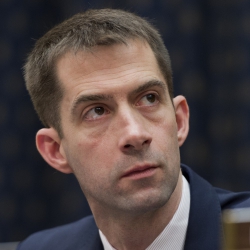U.S. Senator Tom Cotton, a Republican from Arkansas, filed S.3376 yesterday in the U.S. Senate today. The bill, which seeks to ban online gambling in the United States, was read twice and then referred to the Judiciary Committee. S.3376 is eligible for debate, as well as a vote on its passage.
Like other bills backed by Sheldon Adelson of Las Vegas Sands Corporation fame, Tom Cotton’s anti-gambling bill seeks to ban transactions which support online casinos, poker rooms, and sportsbooks. The bill effectively would end all regulated online gambling in the United States, including New Jersey, Nevada, and Delaware licensed online gambling.
Ensure the Integrity of Laws
Cotton’s bill suggested its author wanted “to ensure the integrity of laws enacted to prevent the use of financial instruments for funding or operating online casinos are not undermined by legal opinions not carrying the force of law issued by the federal government lawyers.”
Sen. Cotton has not filed more than a title and a place-holding sentence to describe the legislation. It is being considered by the Senate Judiciary Committee.
Senate Bill 3376
Senate Bill 3376 is designed to reinstate the interpretation of the UIGEA law which prevailed from December 31, 2006 until late 2011. In 2011, the state attorney generals of Illinois and New York asked the US Department of Justice for an opinion on which forms of wireless gambling were covered by the UIGEA.
The Unlawful Internet Gambling Enforcement Act of 2006 (UIGEA) stated that the it was illegal to transact payments made on activities which were made illegal under the 1961 Wire Act. The Wire Act said it was illegal to gamble over the telephone lines, a law which was used to send many mobsters and racketeers to prison from the 1960’s and on.
Interpretations of the Wire Act
The Department of Justice under George W. Bush took the view that the Wire Act covered gambling over the phone lines, so it should cover gambling over the Internet and wireless communications. The Department of Justice under Barack Obama noted that the Wire Act specifically noted sports betting, and did not mention casino gambling or poker. Thus, online casinos and online poker were not banned under the UIGEA.
That is why the bills sponsored by Sen. Lindsey Graham and Rep. Jason Chaffetz these past few years have been called “Restoration of the Wire Act”. It was designed to restore what Sheldon Adelson’s allies in the Congress believed was the Wire Act’s original intention — to stop all gambling over the telecommunications infrastructure.
2011 Department of Justice Opinion
The 2011 DoJ opinion stated that individual U.S. states could legalize online poker and casinos, if they chose. Since then, New Jersey, Nevada, and Delaware have chosen to do so. Proponents of legal gambling in those states would say it is absurb to assume the Wire Act banned online poker and online casinos, since those forms of gambling did not exist until at least 30 years after the Wire Act was passed.
Traditional conversatives and libertarians have argued that a wider interpretation of the UIGEA is liberal. An expanded vision of the UIGEA gives the federal government the right to decide whether gambling is legal or illegal, instead of allowed individual states the right to decide. Thus, the debate hinges on state’s rights versus federal authority.
Sheldon Adelson’s Arguments
Sheldon Adelson argues that a ban on online gambling protects the citizens of the United States from dangerous gambling. Adelson, who became the 8th-wealthiest person in the world from his land-based casinos, claims that his form of gambling is healthier than online and mobile gambling, because it is less convenient. Mobile gambling allows a person to sit in the doctor’s office and engage in problem gambling. Adelson has suggested mobile casinos are also a danger to underage gamblers, who can hack the age verification software, but have a limited view of the consequences of gambling.
Proponents of Restore America’s Wire Act (RAWA) also suggested that state’s rights were being impinged, because New Jersey online casinos allowed players from South Carolina or Utah to gamble on their sites. Those facts were challenged in a serious of congressional hearings, in which geolocation software and GPS technology showed no such dangers existed. Because most Americans are familiar with the accuracy of GPS systems in their cars and smartphones, that main argument for federal oversight fell by the wayside.

